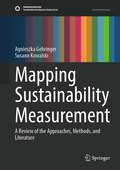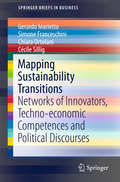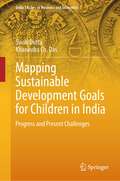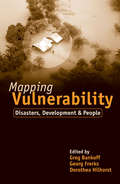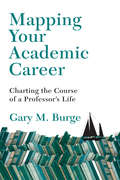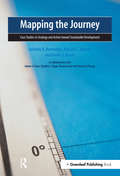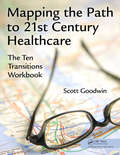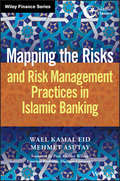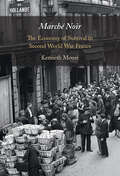- Table View
- List View
Mapping Sustainability Measurement: A Review of the Approaches, Methods, and Literature (Sustainable Development Goals Series)
by Agnieszka Gehringer Susann KowalskiThis book explores modern approaches to sustainability and its measurement. It thoroughly reviews a wide range of existing sustainability measurement systems. Accordingly, the book documents the state of progress toward sustainability measurement by first assessing the past development of wellbeing measurement going beyond GDP and synthesizing the various conceptual approaches to sustainability and its dimensions. It then explores crucial methodological aspects that stay at the core of constructing a sound index system. In the main part of the book, we map the available indices or index systems, their conceptual and methodological backgrounds as well as approaches, which have not yet resulted in an index, but have the potential to contribute to a better understanding of sustainability. More specifically, the book assesses the scope, motivation, and potential usage of each index. It also documents their limitations and drawbacks. This mapping exercise is useful for policymakers, researchers, and practitioners as it offers a detailed and compact overview of where we are and what we still need to account for when measuring sustainability.
Mapping Sustainability Transitions
by Gerardo Marletto Simone Franceschini Chiara Ortolani Cécile SilligThis book was written for anyone wishing to understand how sustainable scenarios emerge from current innovations. It complements current sustainability transition research by providing a "socio-technical map," an analytical and operational tool that can be used to explain the current positioning of innovators and their networks; to form alternative transition pathways and scenarios; and to design policies for a sustainability transition. Drawing on multiple disciplinary approaches to the study of "green" innovations and focusing specifically on operational directives, it examines and assesses multiple transition pathways (and supporting networks). Lastly, it presents three sectorial case studies (urban mobility, agri-food, and lighting) to demonstrate how the "socio-technical map" can be concretely put into practice.
Mapping Sustainable Development Goals for Children in India: Progress and Present Challenges (India Studies in Business and Economics)
by Swati Dutta Khanindra Ch. DasThis book offers a comprehensive exploration of child well-being within the context of Indian states, focusing on the progress made in eight Sustainable Development Goals (SDG) targets. What sets this book apart is its unique perspective, as it delves into the well-being of children, examining their experiences across six key dimensions: child poverty and deprivation, anthropometric failure and undernutrition, child health and healthcare services, quality education, violence and gender equity, and overall child well-being.The book relies on data from various data sources such as the National Family Health Survey, Unified District Information System, and National Crime Records Bureau statistics. The child well-being score is calculated following the UNDP methodology, enabling a ranking of states and districts in terms of their progress between 2015-16 and 2019-21.In addition to rigorous quantitative analysis, the book delves into the implications of key policies like the National Education Policy, National Health Policy, social protection schemes, and Poshan Abhiyan on child development and their role in achieving SDG targets. It systematically compares the performance of Indian states in relation to SDG targets, using child-specific indicators, making this book truly unique. It incorporates more than 30 child-related indicators, spanning the eight child-specific SDGs selected for analysis. The child well-being achievement score from 2015-16 serves as a baseline for assessing the progress toward SDG goals. The indicators presented in this book serve as valuable tools for tracking SDG progress and sustainably monitoring child well-being at the state level. Ultimately, the book not only reveals the depth of deprivations but also provides a roadmap for region-specific priority areas, strongly advocating for child-centric policy interventions.This book will be useful for the academicians, policy makers, government officials, civil bodies, NGOs and other research communities including doctoral researchers who are working in the field of child wellbeing.
Mapping Urban Regeneration: City Life Experiences in Yunnan, China (Urban Sustainability)
by Ali CheshmehzangiThis book is an unusual attempt to study urban regeneration. First, it is based on mapping the realities of urban regeneration case study examples and their impacts on people, places, and city life experiences. Second, it is context-specific, exploring only a particular region rather than covering one country or multiple locations. Hence, the aim is to avoid generic and global solutions but rather focus on local pathways and directions. Third, it delves into specific case study examples that could share some lessons for research, practice, and academia, particularly in the field of urban regeneration. This book is the first of (hopefully) many more on the way in urban mapping studies with various themes and focus areas. The ultimate goal is to ensure urban mapping is recognized well and practiced extensively in research and education. It is essential to map realities in cities and communities, those that we usually witness but should be experienced, perceived, and touched—not just via desk research. Mapping techniques are more than just common tools in urbanism, urban geography, urban studies, urban planning, etc. They are not just tools but inventive ways of understanding cities, places, communities, experiences, and people. Thus, in this book, we try to understand more about people and places through life experiences and mapping the urban regeneration projects of multiple cities in Yunnan Province. This collection is based on a very concise context-specific research focused on only one region. The decision to do so is intentional, just because contextual, cultural, and local attributes need to be looked at more accurately, considerably, and dexterously. Hence, this collection delves into case study examples of an inspiring location where traditions remain, resources are plenteous, and cultures are diverse. Yunnan is one of the few provinces left in China that offers a lot for comprehensive research studies at the urban, rural, and township levels. The experiences we gained from mapping studies, observations, and multi-stakeholder engagements are exceptionally rich and vibrant, allowing us to think more holistically and find ways and suggestions beyond just the generic globalized models elsewhere. We hope the book will be useful to various stakeholders, particularly urban specialists, researchers, and students. It is also a valuable collection for policymakers, decision-makers, and governmental authorities, who should refrain from top-down processes and bring back people to the heart of urban regeneration processes.
Mapping Vulnerability: "Disasters, Development and People"
by Greg Bankoff Georg FrerksRaging floods, massive storms and cataclysmic earthquakes: every year up to 340 million people are affected by these and other disasters, which cause loss of life and damage to personal property, agriculture, and infrastructure. So what can be done? The key to understanding the causes of disasters and mitigating their impacts is the concept of 'vulnerability'. Mapping Vulnerability analyses 'vulnerability' as a concept central to the way we understand disasters and their magnitude and impact. Written and edited by a distinguished group of disaster scholars and practitioners, this book is a counterbalance to those technocratic approaches that limit themselves to simply looking at disasters as natural phenomena. Through the notion of vulnerability, the authors stress the importance of social processes and human-environmental interactions as causal agents in the making of disasters. They critically examine what renders communities unsafe - a condition, they argue, that depends primarily on the relative position of advantage or disadvantage that a particular group occupies within a society's social order. The book also looks at vulnerability in terms of its relationship to development and its impact on policy and people's lives, through consideration of selected case studies drawn from Africa, Asia and Latin America. Mapping Vulnerability is essential reading for academics, students, policymakers and practitioners in disaster studies, geography, development studies, economics, environmental studies and sociology.
Mapping Your Academic Career: Charting the Course of a Professor's Life
by Gary M. BurgeNijay Gupta's Best Academic NT Books of 2015, Honorable Mention, AcademiaMapping Your Academic Career
Mapping Your Opportunities: An Analysis of Society, Technology, and Resources (STaR)--Building Sustainability into Business Strategy
by Adam WerbachTime and again, changes in society, technology, and resources move sustainability to the desks of CEOs everywhere. If you hope to make your business more sustainable (and successful), you must first map the opportunities so that they are consistent with core business strengths and values. In this chapter, sustainability expert Adam Werbach explains how to use a system he calls STaR mapping (Society, Technology, and Resources) to identify and analyze the changes or trends that are affecting or could affect a business, and begin to map the key threats and opportunities your business faces. This chapter was originally published as chapter 2 of "Strategy for Sustainability: A Business Manifesto."
Mapping and Spatial Analysis of Socio-economic and Environmental Indicators for Sustainable Development: Case Studies from North Africa (Advances in Science, Technology & Innovation)
by Noamen Rebai Mohamed MastereThis book presents most recent research studies on mapping and spatial analysis of socio-economic and environmental indicators used by various national and international contributors to regional development projects. It gathers the best contributions to the 1st International Conference on Mapping and Spatial Analysis of Socio-Economic and Environmental Indicators for the Local and Regional Sustainable Development. The conference was held in southern Tunisia, Tataouine in March 2015.The research studies focused on generating and analyzing indicators in various domains of Agriculture, Energy, Industry, Tourism, Transport, Urban Planning, Exploitation of Natural Resources, Infrastructure, Health, Environment, Education, Information and Communication Technologies, Social Affairs and Employability, and Culture and Sport. Socio-economic and environmental indicators are important in regional development plans and strategies as they allow to observe and analyze changes in the economic growth and to measure their impact on the environment and on social networks/daily life of citizens. On the basis of well-defined geomatic approaches, and particularly, through sophisticated digital mapping and spatio-temporal analyses, authors focused on retrieving indicators to evaluate the exploitation rate of natural resources, intensity of the energy consumption in various economic sector, net migratory flows, quality checking of the air in urban areas, adaptation to climate change, and vulnerability of the coastal domain and risk of marine submersion due to sea-level rise. The book is of interest not only to investors and contributors to regional development projects, but also to all relevant policy makers.
Mapping the Future of Undergraduate Career Education: Equitable Career Learning, Development, and Preparation in the New World of Work
by Melanie V. BufordThis timely book explores current trends and future possibilities for undergraduate career education, the nature of the changing workplace, and its impact on students in colleges and universities. Built on decades of experience in career development and professional learning, the editors raise and investigate multiple critical issues facing career educators in higher education today: preparing students for the future of work; exploring the increasing centrality of experiential learning in career education; examining innovative paradigm shifts in career education; and developing strategies for equity-focused and inclusive programming for all students. Reckoning with the effects of Covid-19 on the world of career development, this book draws on contributions from leading scholars, entrepreneurs, and practitioners from across the fields of education, business, STEM, and the humanities to offer an inclusive and innovation-focused approach to supporting scholars, practitioners, and students involved with career education, development, and counseling for a new generation – and a new world of work.
Mapping the Global Architect of Alterity: Practice, Representation and Education
by Michael JensonDue to globalization, cultural spaces are now developing with no tangible connection to geographical place. The territorial logic traditionally used to underpin architecture and envision our built environment is being radically altered, forcing the adoption of a new method of conceptualizing space/geography and what constitutes architectural practice. Construction techniques, design sensibilities, and cultural identities are being transformed as technology transports us to places that were previously unreachable. The resultant "globalized" architect must become more than just an artful visionary, but also a master of the art of the political nudge willing to act within multiple mediums and at the simultaneous scales of a chaotic new world disorder. Though fearless they must also be responsible, inherently understanding the necessity to align bold visions with the mundane details of the everyday in ways that are culturally flexible and accepting of change. The potential for what must be considered the legitimate practice of the architect must move from a purely material venue to one more directly engaged in the chaos of the larger economic, political, and social spheres of a globalizing world. The issues and possible interactions with globalization contained in this text exemplify ways that architecture is transforming into a more flexible and fluid interdisciplinary version of its traditional self in order to rise to challenges of this new international terrain. A theme runs throughout in the form of a call: that architects must conceptually re-construct their frames of reference to better align with the demands of a rapidly globalizing world.
Mapping the Journey: Case Studies in Strategy and Action toward Sustainable Development
by Lorinda R. Rowledge Russell Barton Kevin Brady James Fava Cynthia Figge Konrad Saur Steven YoungThis illuminating new book presents a series of in-depth case studies from around the world based on numerous personal interviews with organizational leaders and focusing on their journey towards sustainability. The aim is to provide visions of a more sustainable future, and shed light on the path, milestones and solutions – in particular the management processes these organizations employed – to provide a reliable compass that others can follow. Although each organization must take steps to fit its particular circumstance, business conditions and culture, Mapping the Journey proves that valuable lessons can be learned by setting aside critique as to where these organizations may yet make progress and instead focusing on the guidelines, targets, measures of success, tools and techniques and valuable wisdom about how pioneer organisations are travelling toward a prosperous, sustainable future. Each organization included has crafted its own unique strategic responses to an identified need for increased sustainability. While none can be said to have reached the end-point of a sustainable development strategy, all have found that, by addressing the challenge of sustainable industrial practices, they have found innovative solutions, new opportunities for revenue generation, better relationships with customers, new business and product opportunities and a boost to morale from the executive ranks to front-line employees. Mapping the Journey examines both public and private organizations worldwide: SJ Rail of Sweden; Sony Corporation; SC Johnson; TransAlta Corporation; Patagonia; Henkel; Volvo; ASG; Interface Flooring Systems; Suncor; DaimlerChrysler; AssiDoman; Germany's Centre for Technology Assessment and the Dutch National Environmental Policy Plan. These case studies provide an inspiring framework of effective processes for defining a sustainable development strategy and transforming it successfully into actions and results.
Mapping the Mind: How Thought Circulates--Unlocking Your Integrative Thinking Ability
by Roger L. Martin Das Narayandas Doug J. ChungIn this chapter, the author introduces a framework for building integrative thinking capacity and describes how your personal knowledge system works.
Mapping the Path to 21st Century Healthcare: The Ten Transitions Workbook
by Scott GoodwinThe author‘s previous book, Transition to 21st Century Healthcare: A Guide for Leaders and Quality Professionals, provides a high-level view of American healthcare as transitioning through a period of industrialization, breaking down the fading structures of 20th century healthcare, and paving the way for 21st century healthcare.Mapping the Path to
Mapping the Risks and Risk Management Practices in Islamic Banking (Wiley Finance)
by Mehmet Asutay Wael Kamal EidDeep, insightful analysis of controversial risk management issues in Islamic banking Mapping the Risks And Risk Management Practices In Islamic Banking is a comprehensive analysis of the current state of risk management practices within the Islamic banking industry, with recommendations for policy makers, bankers, and industry stakeholders. Going beyond the academic, this book presents the opinions and perceptions of industry financiers and bankers, alongside primary information and data collected by Islamic finance professionals to deconstruct and analyze the sector's current risk management practices. You'll get up to date on the latest attitudes and trends, and delve into the current issues surrounding risk management in Islamic banks. With a focus on practical applications, this authoritative guide discusses the unique risks facing Islamic banks, from the perspective of a wide range of practitioners. Risk management is one of the biggest, most controversial issues in Islamic finance, yet it remains under-researched. Many uncertainties exist for which the answers are still unclear, yet will play a large role in shaping the industry's future. This book digs deep into current ideas and practices to discover what's being done, what needs to be done, and what needs to stop happening to keep the future of Islamic finance strong. Explore both Islamic and traditional attitudes toward risk Examine current Islamic risk management practices Understand the latest industry issues and trends Consider the diverse range of risks unique to the Islamic banking sector Effective risk management in Islamic banking deserves priority attention. Unless the industry develops its own genuine risk management architecture, it cannot achieve its full potential and the viability needed for a more resilient financial system than the debunked Wall Street model. Mapping the Risks and Risk Management Practices in Islamic Banking provides a deep, authoritative analysis of where the industry is today and where it needs to develop.
Mapping the Scientific Landscape: Advances in the Drug Sciences
by Gary P. PisanoToo often discussions in both the popular press and academic studies of the pharmaceutical or biotechnology industry treat the science of drug discovery as if it were a single body of knowledge, obscuring the critical fact that not one, but several scientific revolutions have gripped drug discovery over the last 130 years. In this chapter, the author examines the historical evolution of the science of drug discovery, highlighting the heterogeneity of the scientific landscape. This chapter is excerpted from "Science Business: The Promise, the Reality, and the Future of Biotech."
Maps of Quality of Life in Argentina Since the 19th Century (The Latin American Studies Book Series)
by Juan Pablo Celemin Guillermo Angel VelázquezThe book is presented as an Atlas where the map plays a fundamental role in the study of quality of life, as it shows its progression in Argentina from the 19th to the 21st Century. In the book, it can be observed how the concept has evolved along with the dimensions and variables that better represent its spatial distribution. This is one of the original points of the book: the temporal study of the living conditions of the argentine population, empirically and spatially, emphasizing their territorial representation. Although the book maintains the same socioeconomic dimensions (education, health and housing), the tour through the different chapters offers a historical window that allows the reader to know what the forms of information collection were like in different historical moments. This book is written for geographers and members of the scientific community interested in the study of the well-being of the population. It also allows us to observe the evolution of the quality of life from the 19th century to the 21st, so it may be of interest to historians as well.
MarTech, KI und Automatisierung: Marketingtechnologie verstehen, anwenden und skalieren
by Andreas FuchsDas Marketing erlebt einen radikalen Wandel: Unternehmen stehen vor der Herausforderung, eine Flut an Technologien, Daten und Automatisierungsmöglichkeiten strategisch zu nutzen. Doch wie setzt man MarTech und Künstliche Intelligenz gezielt ein, um Wettbewerbsvorteile zu sichern? Dieses Buch verbindet wissenschaftlich fundierte Erkenntnisse mit praxisnahen Best Practices und hilft dabei, Klarheit in die oft unübersichtliche MarTech-Landschaft zu bringen. Andreas Fuchs zeigt, wie Unternehmen ihre Datenbasis optimal nutzen, personalisierte Kundenerlebnisse schaffen und Marketingprozesse intelligent orchestrieren. Das Marketing Technology Framework bildet dabei die strukturierte Grundlage – von der Datenstrategie über smarte Segmentierung bis hin zur kanalübergreifenden Kundeninteraktion. Zahlreiche Praxisbeispiele und konkrete Handlungsempfehlungen machen das Buch zu einem unverzichtbaren Leitfaden für alle, die MarTech als echten Wachstumsmotor nutzen möchten. Der Inhalt Warum MarTech die Zukunft des Marketings ist Know-Phase: Datengrundlage schaffen Analyze-Phase: Kundenverhalten verstehen und vorhersagen Orchestrate-Phase: Einheitliches Erlebnis über alle Kanäle schaffen Engage & Measure-Phase: Marketingaktivitäten messen und optimieren Künstliche Intelligenz und Automatisierung im Marketing
Mara Group
by Eugene Soltes Sara HessMara Group is a rapidly growing Pan-African conglomerate run by its entrepreneurial CEO Ashish Thakkar. The case explores Thakkar's decision on which African markets to expand operations into.
Mara Group (B)
by Eugene Soltes Sara HessMara Group is a rapidly growing Pan-African conglomerate run by its entrepreneurial CEO Ashish Thakkar. The case explores Thakkar's decision on which African markets to expand operations into.
Marc Rich and Global Commodity Trading
by Geoffrey G. Jones Espen StorliExamines the career of Marc Rich, the world's leading commodity trader before his criminal indictment in the United States in 1983. The case surveys the historical growth of commodity trading, especially in metals, from the late nineteenth century, and its evolving forms as governments intervened in markets after 1945. Rich joined Philipp Brothers, then the largest commodity trader, in 1954. He formed his own firm two decades later. He was instrumental in the creation of a spot market in petroleum, and assumed a pivotal role in the industry during the 1970s by selling Iranian oil to Israel and South Africa. The case provides a means to explore the rationale and advantages of giant commodity traders, as well as enabling students to debate corporate use of tax havens.
Marché Noir: The Economy of Survival in Second World War France
by Kenneth MouréKenneth Mouré shows how the black market in Vichy France developed not only to serve German exploitation, but also as an essential strategy for survival for commerce and consumers. His analysis explains how and why the black market became so prevalent and powerful in France and remained necessary after Liberation. Marché Noir draws on diverse French archives as well as diaries, memoirs and contemporary fiction, to highlight the importance of the black market in everyday life. Vichy's economic controls set the context for adaptations – by commerce facing economic and political constraints, and by consumers needing essential goods. Vichy collaboration in this realm seriously damaged the regime's legitimacy. Marché Noir offers new insights into the dynamics of black markets in wartime, and how illicit trade in France served not only to exploit consumer needs and increase German power, but also to aid communities in their strategies for survival.
Marcia Radosevich and Health Payment Review--1989 (A)
by Amar V. Bhide Brian MohanMartha Radosevich, president of Health Payment Review, a small software start-up, confronts a serious cash-flow problem: Health Payment Review has built a PC-based prototype but has run out of funds to build a commercially acceptable mainframe product. As a stop-gap measure to generate cash, Marcia tries to sell the PC prototype but encounters resistance from conservative buyers. Teaching Purpose: To highlight the challenges of selling and negotiation faced by entrepreneurs, and to help students develop their skills in this area.
Marcus by Goldman Sachs
by David Lane Rory McDonald Samir JunnarkarFive years on from the 2008 financial crisis, Goldman Sachs remained wounded. Revenues at the global investment bank had stagnated below pre-crisis levels, and the firm had yet to rebound from a substantial decline in securities-trading revenues. Marcus by Goldman Sachs was one response-an effort that operated as a start-up but was sponsored by senior Goldman executives-to grow the firm's revenues by entering consumer banking with digital-only offerings. The moved marked a dramatic cultural as well as product shift: the 150 year-old institution historically served only businesses and the wealthiest of individuals. In 2016, Marcus launched unsecured personal loans for the mass market; it rolled out high-yield deposits in 2017 and a credit card in partnership with Apple in 2019. By autumn of that year, Marcus had $5 billion in loans outstanding and $55 billion in deposits. It also faced a dilemma-ceaseless and rapid expansion had strained its people and infrastructure, yet Goldman expected Marcus to generate $1 billion in revenues in 2020. What now was the better bet, to pause to allow performance to catch up with growth, or to seize the additional opportunities that beckoned for Marcus to diversify into consumer finance products?
Marea negra
by Alberto Vázquez-FigueroaA finales de la década de 1970, y tras la gran crisis del petróleo de 1973 que no fue más que el punto álgido de una remontada de precios que se había iniciado en la década anterior, una comisión del Mercado Común encarga a una joven francesa una difícil misión: conseguir que Venezuela se separe de la OPEP, rompa su dependencia económica con Estados Unidos y acepte la tecnología europea a cambio de vender al Viejo Continente todo el petróleo que necesite, a precio razonable, durante cinco años. Mas para conseguirlo la mujer ha de entregarse a un general venezolano locamente enamorado de ella...
Margaret Thatcher
by Herminia Ibarra Jennifer M. SuessePortrays Margaret Thatcher's rise to the leadership of Great Britain's Conservative Party. Thatcher's political career began with her election to Parliament's House of Commons in 1959. Sixteen years later she was elected the leader of her party, and then in 1979, she became prime minister. Thatcher's emergence as a world leader illustrates her unlikely transition from ultimate outsider to powerful insider.
